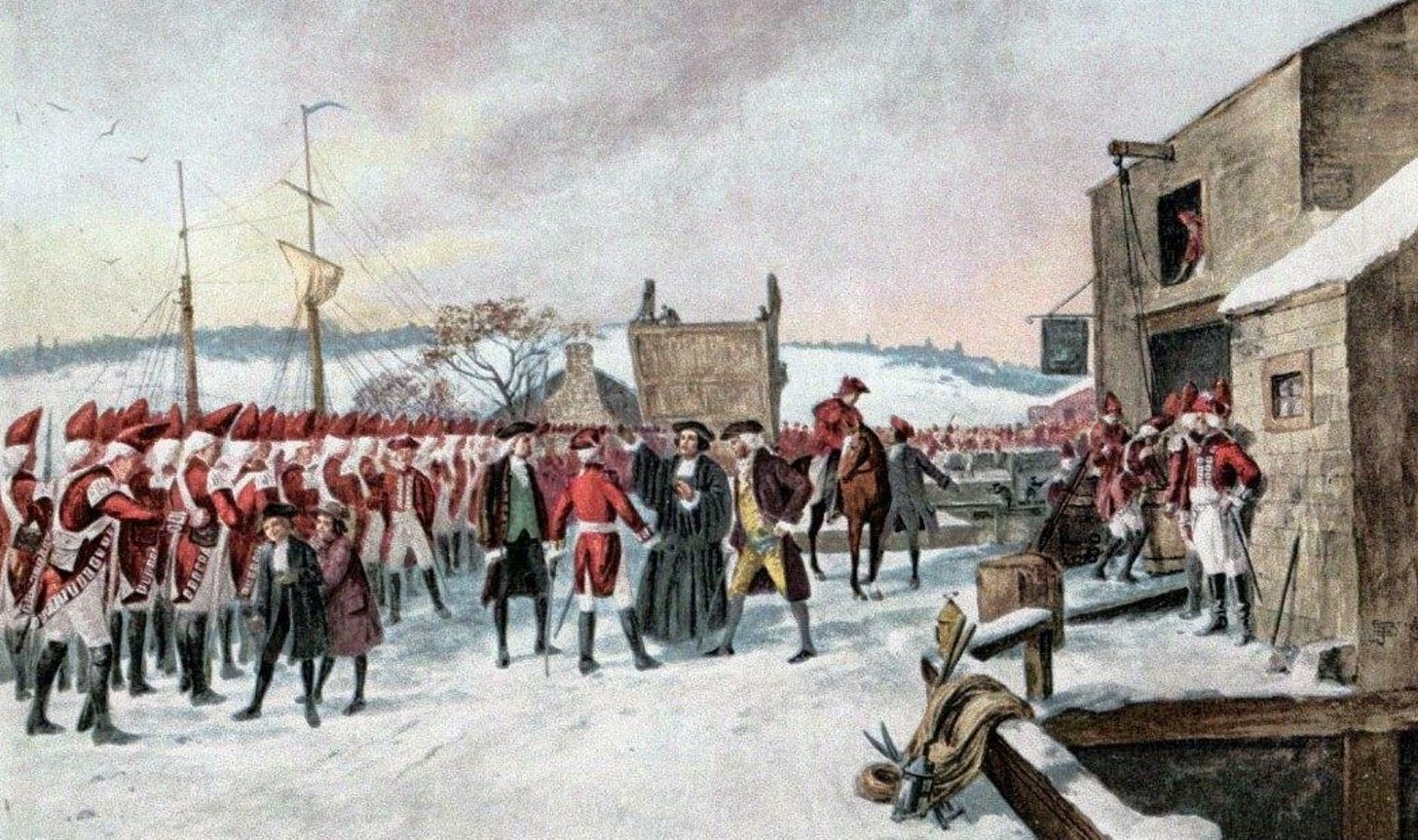TDIH: The American Revolution (almost) starts
Did you know that the “shot heard ‘round the world” could have occurred in February 1775 instead of April 1775?
On this day in 1775, the American Revolution nearly begins in Salem, Massachusetts. Did you know that the “shot heard ‘round the world” could have occurred in February 1775 instead of April 1775?
The root cause still would have been arms, ammunition—and a British attempt to take them.
Tensions had been rising in Massachusetts. Thus, when British Lt. General Thomas Gage learned that there was a stash of arms and ammunition—including several cannons—in Salem, he swung into action, ordering Colonel Alexander Leslie to head that way.
Leslie’s contingent of men would travel aboard boats from Boston to Marblehead, with soldiers secretively hidden under hatches so they couldn’t be spotted from shore. The group departed just after sunset on Saturday, February 25. They hoped to travel under cover of darkness, then spring their surprise while the people were in church.
Naturally, someone saw the soldiers as they emerged from their boats at Marblehead. Messengers flew to Salem with a warning.
The colonists had been expecting something like this for quite a while. They worked quickly, moving their cache of arms to a safer location. “To remove as many of the guns as the time would permit,” one early historian describes, “beyond the reach of the troops, and to a place of safety, appeared the universal determination of the people.”
Soon the British were marching into Salem. Perhaps Leslie was feeling pretty good about himself by this point? He soon found a “young tory lawyer” who pointed him north of town, where the arms could be found.
Leslie would need to cross the North Bridge to get to his destination. Perhaps you won’t be surprised to hear that the militia were already there. They’d raised the drawbridge and stationed sentries nearby.
Leslie couldn’t cross the river, but retreat would bring disgrace. He turned to a nearby officer, issuing an unprecedented order: Fire upon the people!
Fortunately, a colonial militia officer overheard the shocking order. Captain John Felt was nearby because he’d been following Leslie’s troops from town. “If you do fire,” Felt told Leslie, “you will all be dead men.”
Leslie did not repeat his order, but he was getting frustrated. The conversation that followed went something like this:
“I am determined to pass over this bridge before I return to Boston,” said Leslie, “if I remain here until next autumn.”
“Nobody would care for that,” Felt observed. But Leslie was still going, apparently getting animated. “By God, I will not be defeated!” he declared. “You must acknowledge that you have been already baffled,” from Felt, more calmly.
Leslie sent his men after some nearby gondolas. But the colonists had already seen the possible breach of their defenses, and they’d moved to scuttle the boats.
The day was coming to a close and Leslie began looking to save face. Finally, a compromise was brokered: The drawbridge would be lowered so Leslie could pass over it, as he said he’d been ordered to. The troops would march a specified distance past the bridge, then turn around and head back.
One local woman taunted them as they left: “Go home and tell your master he has sent you on a fool’s errand, and broken the peace of our Sabbath,—what! Do you think we were born in the woods to be frightened by owls?”
The British soldiers finally retreated with as much dignity as they could muster. But the American Revolution and our fight for liberty were just around the corner.
Sources can always be found on my website, here.





I love the way you tell this story Tara. Thank you.
I can picture the people of Salem as they "baffle" the British soldiers. It makes me proud to be an American. May God continue to bless and protect the United States of America.
Like so many readers, I appreciate reviewing our history through your eyes. Such brave men and women, fighting for what they believed in. I often wonder what US History classes will be like in a few decades. I'm afraid a far cry from what we studied. Thank you, Tara!